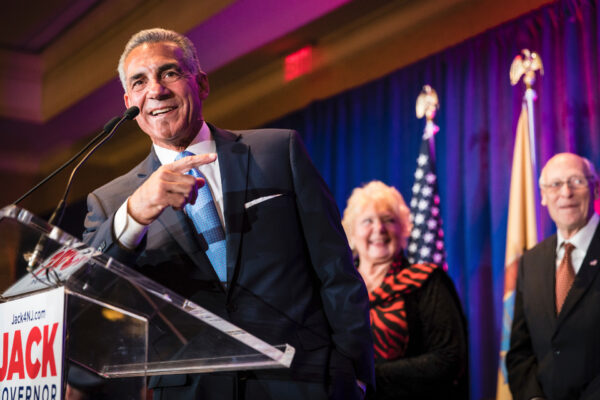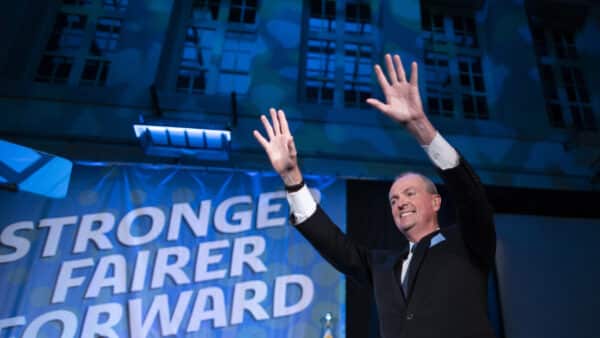Unofficial results of the gubernatorial election in New Jersey showed the incumbent Democratic governor Phil Murphy in a dead heat with Republican challenger Jack Ciattarelli, with 98 percent of precincts reporting.
Incomplete returns showed Murphy leading the race by 1,408 votes out of more than 2.3 million cast. The voters’ turnout was about 34 percent of New Jerseyans who can vote.
New Jersey Secretary of State Tahesha Way said on Monday at a press conference that more than 200,000 New Jerseyans cast their ballots during early voting in person and nearly 500,000 voted by mail, according to the New Jersey Herald. These votes represent more than 10 percent of the state’s registered voters.
At 12:30 a.m., Ciattarelli said he couldn’t yet declare a victory because votes remained to be counted, but said he fully expected to make a victory declaration once that happens.
“We’ve sent a message to the entire nation. This is what I love about this state: Every single time it’s gone too far off track, the people of this state have pushed, pulled, and prodded it right back to where it needs to be,” he told the crowd.
No Democrat has won reelection as governor in New Jersey since Brendan Byrne in 1977, and the party opposite the president’s has won the New Jersey governorship going back to 1985.
In 1981, Republican Gov. Tom Kean won the election in New Jersey by only 1,797 votes out of 3 million cast.
The American Civil Liberties Union (ACLU) of New Jersey and League of Women Voters (LWV) filed a lawsuit on Nov. 2 against the state, requesting to extend voting hours due to technical and operational issues causing delays at some polling locations.
“Delays caused by technical issues aren’t an excuse to deny voters their right to vote,” ACLU said on Twitter.
“Operational & technical issues this morning at polling locations around the state made voters leave without casting a ballot,” LWV posted on Twitter.
The judge denied their request on the same day, ACLU said, but New Jersey Secretary of State Tahesha Way said on Twitter that voters who were in line at the poll closing time (8 pm) would be able to vote, “no matter how long it takes.”
New Jersey voters- The polls will close at 8 pm. If you are on line to vote at 8 pm, stay in line and you will be able to vote, no matter how long it takes.
— New Jersey Secretary of State Tahesha Way (@SecretaryWay) November 2, 2021
The Contenders
Gov. Phil Murphy, who is seeking a second term, held leadership roles at Goldman Sachs’s offices in Germany and Hong Kong for more than 20 years and served as an ambassador to Germany during the Obama administration. He was also a finance chair for the Democratic National Committee.
Murphy campaigned on a range of policies he implemented during his tenure as a governor, such as tax fairness for middle-class families, minimum wage at $15 an hour, more affordable public education, more child care, environmental policies, and legalizing marijuana. His campaign’s slogan is “It’s about how we move forward.”
However, the effects of his policies drew criticism from his challenger and Republican lawmakers. Murphy was also criticized for his decisions to increase taxes, imposing mask mandates on children, his policy to admit patients to nursing homes regardless of their COVID-19 status, and his late response to hurricane Ida.
Murphy has been endorsed by President Joe Biden and Vice President Kamala Harris for reelection.
Former President Barack Obama also stumped for the incumbent governor at Murphy’s campaign rally in Newark, New Jersey—the most populous city in the state—about a week and a half before the election.
“Make sure you vote for Democrats up and down the ballot, including state legislatures where a lot of important work gets done,” Obama told the audience at the rally. “Give Phil Murphy four more years.”
Sen. Bernie Sanders (I-Vt.) an openly socialist member of the Congressional Progressive Caucus, also stumped for Murphy a campaign rally at Rutgers University in New Brunswick, New Jersey. Sanders called Murphy “one of the most progressive” governors in the country and asked the audience to vote for Murphy and bring others to vote for him as well.
Murphy won his first term in 2017 with 56 percent of the vote, beating Republican then-Lt. Gov. Kim Guadagno who received 42 percent. Voter turnout at that time was 36 percent.

Republican challenger Jack Ciattarelli is a certified public accountant, a two-time small-business owner, a former New Jersey assemblyman, and a lifelong resident of New Jersey.
Ciattarelli campaigned under the banner “Let’s Fix New Jersey.” He told New Jerseyans that as a governor he would address the state’s most pressing issues such as the highest property taxes in the nation, state governments overspending, insufficient support for local and state police, and reforming public school curriculum.
The governor’s challenger also promised to foster business growth and create more jobs in the state.
Ciattarelli had raised more than $13 million to finance his campaign and spent $12.4 million as of Oct. 29, according to a report by New Jersey Election Law Enforcement Commission (pdf). Murphy had raised more than $16 million for his campaign and spent nearly $12.6 million.
New Jersey Legislative Races
All 120 seats in New Jersey’s Legislature were on the ballot in this year’s election. Many precincts are still expected to report the results of the legislative election.
The results in districts that completed their reporting at the time of publication showed that Republicans unseated one senator and four assembly members.
Coming into Election Day, Democrats had controlled the Assembly with 52 seats to Republicans’ 28. In the Senate, Democrats had 25 seats to the Republicans’ 15.
New Jersey’s Legislature consists of 40 districts, which each send one senator and two assembly members to Trenton. Assembly members serve two-year terms, while senators serve four-year terms, except for the first election after the census—which comes this year—when they serve two-year terms.
The Associated Press contributed to this report.





